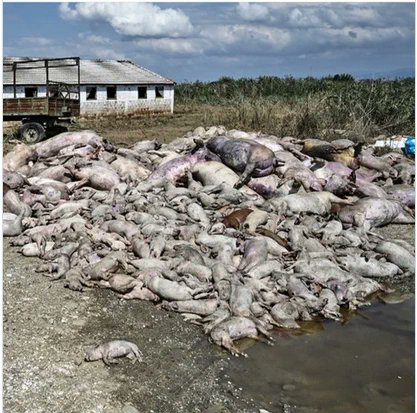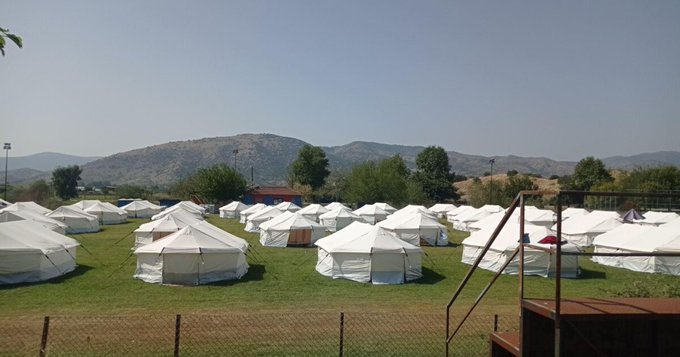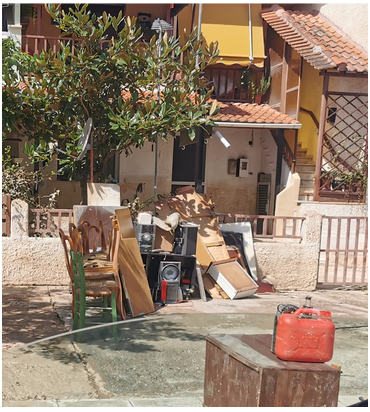The way climate scientists act and communicate is part of the problem of general denial. Our profession is intentionally being kept in a theoretical vacuum that borders infantility.
Wolfgang Knorr is a climate scientist, consultant for the European Space Agency and guest researcher at the Department of Geography and Ecosystem Science, Lund University
This is the second part of a four part series of articles by Wolfgang after his return to his home in Greece. The other articles are “Climate scientist hit by major climate event” , Climate Change: When Official Panic Sets In , and “The Dawn of a New Phase of Climate Policy” (Just click on the title to read the article).
Photo: Hellenic Animal Welfare
We climate scientists are a strange breed. First-hand experience with climate disasters is not normally among our job requirements. Imagine a firefighter without experience with fires, or a physician who’s never seen a sick person. No matter, we would never put first-hand experience with climate disasters on top of our CVs, for fear of looking emotionally biased and not able to produce “objective science”. As if, to use an apt analogue, clinical experience was seen as a disadvantage for a career in medical research.
So I will share with you my experience with an event that was clearly linked to planetary heating. On the 10th of September 2023 I was stuck on my way to my family in central Greece, after the most intense precipitation event ever recorded in Europe. First our home was struck, then the rain moved into the agricultural plain of Thessaly. It was an intense downpour in a thunderstorm, only that the downpour instead of a few minutes lasted 18 hours, delivering water masses that would normally rain down in 18 months. The motorway ahead of us was flooded for kilometers.
There are basically two effects that are most directly linked to the turbo-charged greenhouse effect we have created as over-consuming humans: intense heat waves, and extreme rainfall events. The amount of water that can be stored in the air rises exponentially with temperature. It’s simple physics.
But to see the effects is complex human experience. By Thursday the 14th we, it was me with my 7 year old daughter, tried an escape. A number of roads had recently been opened. We drove over beautiful winding mountain roads south of Mt Olympus, filled up on drinking water from a spring, passed by a destroyed bridge correctly identified by the navigator, and after a while descended towards the plains.
What we experienced was shocking. What was once the breadbasket of Greece since antiquity, interspersed by a few narrow rivers we would not even make out from up here, had been turned into a vast floodplain. How would we get around this and home? Even more disturbing, though, was a strange smell we could make out. Something between cooked chickpeas and a pigsty.
More signs appeared: a makeshift tent village by the red cross, lower lying parts where the water was still standing. When we finally reached the proper plain, the smell turned out to be the stench of thousands and thousands of carcasses of animals drowned in the floods. To protect themselves, people here were using the same masks they had recycled from the COVID pandemic.
We saw a playground in the mud after the water had just recently receded, peoples’ personal belongings left out on the street to dry, tractors, trucks and passenger cars abandoned in a rush when the water was coming in.
I was gripped with a sense of doom, impending disaster, and shock in view of the human and non-human tragedy. Later I would hear that on those days, as much as 2% of the Greek lifestock, cattle, sheep and goats, would be lost. If a farmer loses all lifestock or the entire year’s harvest, it is a tragedy that is difficult to express. State aid coming or not.
This sense of impending doom is exactly what leads to the unspoken but omnipresent assumption that climate scientists shouldn’t get too much in contact with reality. Because it is subjective, unreliable, imprecise, and, if it were to spread to the general populace, would only lead too panic.
Is it? The idea that intuition would be more valuable than bare numbers has become so alien in our modern, technocratic world, that we forget that none of the scientific and technological advances of today would exist without intuitive thought and creativity. We tend to vastly overestimate the value of anything that comes out of complicated mathematical algorithms, and look down onto lowly intuitive thinking. The probem is that none of this stands up against the historical facts of climate science and climate policy.
If all we had were personal observations, our own or those reported, like temperatures exceeding 40 degrees Celsius in “impossible” places like London or Hamburg, and the climate science produced at the end of the 19th century by the Swedish physicist Svante Arrhenius, we would know everything we need to act.
But we haven’t. Essentially all talk about the existence of climate policy is self delusion, as long as there is no international agreement limiting and eventually banning the use of fossil fuels. Otherwise, any reduction in demand for oil and gas (or coal) will lead to a fall in prices, and increased consumption elsewhere. We can see this right now with the boycott of Russian oil and gas, which is now being sold at cut down prices to places like India. (This summer we drove through Serbia and North Macedonia, where Gazprom and Lukoil dominated the market selling Diesel fuel at about 20-30% below EU market prices.)
Any fossil fuel taken out of the ground will eventually be burned. These are toxic substances that have to be gotten rid off. But the idea of directly limiting production has never ever touched the scientific, academic, or political discourse. So the absence of any meaningful climate policy is another piece of harsh reality that climate scientists are not supposed to be exposed to, or talk about publicly.
Activists tend to see us climate scientists as their friends. It is understandable given the blatant denial that pervades society. But I am afraid that the way climate scientists act and communicate is part of the problem of general denial. Our profession is intentionally being kept in a theoretical vacuum that borders infantility.
So is the intuitive sense of impending doom correct? I fear it is. Not only is there no meaningful climate policy on the horizon, the climate issue itself is increasingly being caught up in a useless cultural battle between “progressives” and “populists”, with no sign any side admitting that both are off track. The message coming from still modest catastrophes as the one I was witnessing is being left unheard. Therefore, it will have to be a much larger catastrophe until something in our attitude changes. And with “us” I mean all of us in a privileged position, either economically, or in terms of impact on the narrative.
All photos by the author.











Ther are no meaningfull climate policies on the horizoon – unfortunately completly correct. And not enough people speaking of climate taxes.
Illusionary, but the only fast path to real zero emissions